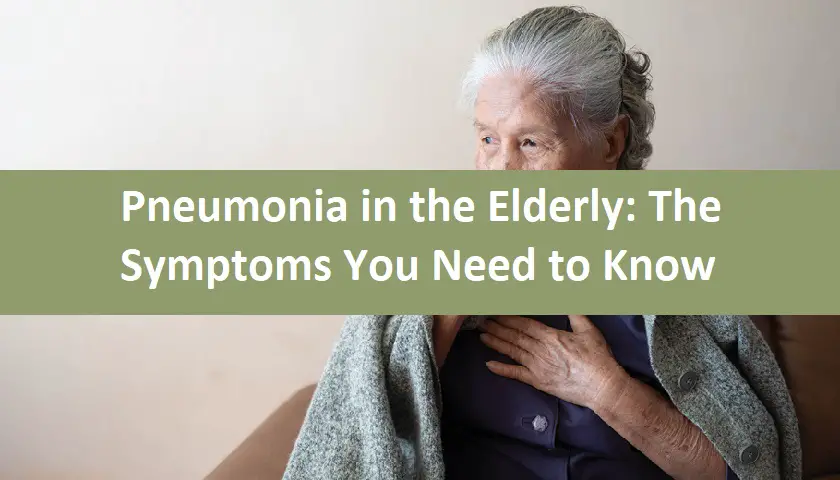The elderly population is an often overlooked one when it comes to health, but knowing the symptoms of pneumonia in the elderly can mean the difference between life and death. Pneumonia, if left untreated, can quickly become fatal, so this blog post aims to educate you on critical signs and symptoms of pneumonia in the elderly that you or a loved one should watch out for. Knowing even basic information about this potentially life-threatening virus can help you ensure your well-being and, if needed, help you make critical care decisions.
Defining Pneumonia in the Elderly
Pneumonia is an infection of the lungs that causes inflammation and can lead to further complications. Bacteria or viruses, such as Streptococcus pneumonia, Staphylococcus aureus, Mycoplasma pneumonia, Haemophilus influenza, Legionella pneumophila, and Chlamydophila pneumonia, typically cause it. Fungi or environmental factors can also cause it.
Signs and Symptoms of Pneumonia in the Elderly
Common Symptoms
- Coughing: One of the most common signs of pneumonia is a persistent cough that may produce mucus with or without color. It is important to watch for how often and how intensely your elderly loved one is coughing, as this could be a sign of a more serious infection.
- Shortness of Breath: If your loved one is having difficulty breathing and cannot get enough air, this is an immediate sign that medical attention should be sought.
- Chest Pain/Discomfort: Any chest pain or discomfort should be taken very seriously as it could indicate several potentially serious medical conditions.
- Fever: If your loved one is feeling feverish and warm to the touch, this could be a sign of pneumonia. It is essential to monitor their temperature as fevers that continue for more than a few days should be discussed with a medical professional.
- Fatigue: Ongoing fatigue and tiredness is often overlooked sign of pneumonia but can indicate a more severe problem.
- Loss of Appetite: A loss of appetite or decreased interest in food could signal that something is wrong and should be discussed with a doctor immediately.
Less Common Symptoms
- Clammy or Pale Skin: If your elderly loved one’s skin appears pale and/or clammy, this could be a sign of pneumonia.
- Nausea and Vomiting: Any signs of nausea or vomiting should immediately be addressed as they can indicate a more serious health problem.
- Confusion: If your elderly loved one is exhibiting signs of confusion or disorientation, this could be a sign that their illness is progressing, and they should be seen by a doctor right away.
Pneumonia Complications in the Elderly
Pneumonia can lead to further complications such as sepsis, which is a life-threatening condition that occurs when the body’s response to infection leads to inflammation throughout the entire body. Other potential complications include respiratory failure and abscesses (pockets of pus) in the lungs.
What to Do In Case of Pneumonia
If you suspect that your elderly loved one may be suffering from pneumonia, it is important to seek medical help right away. It is also beneficial to keep a detailed record of any symptoms they may be experiencing, as this can help healthcare providers diagnose and treat them more effectively. Additionally, make sure to discuss all available treatment options with their doctor before making a decision.
If your elderly loved one has been diagnosed with pneumonia, it is important to help them manage their symptoms and adhere to their prescribed treatment plan.
Preventive Care for Seniors
Get Enough Rest
Seniors need to get enough rest and sleep each night, as this can help their bodies recover from illness.
Eat Healthy Foods
Eating a balanced diet rich in fruits, vegetables, lean proteins, and whole grains can help keep the immune system strong and reduce the risk of getting sick.
Stay Hydrated
Staying hydrated by drinking plenty of water can help keep the respiratory system healthy and flush out toxins.
Manage Stress
Stress can weaken the immune system, making seniors more susceptible to illness. It is important to practice stress management techniques such as deep breathing exercises, mindfulness meditation, or yoga to stay healthy.
Take Your Medications
It is essential to take any prescribed medications as directed by your doctor, as this can help reduce the risk of pneumonia and other illnesses. Additionally, be sure to ask your doctor or pharmacist about any potential side effects or interactions that may occur with other medications.
Conclusion
Pneumonia is a serious and potentially life-threatening illness for seniors, so it is important to be aware of the signs and symptoms that could signal its onset. Additionally, preventive care measures such as getting enough rest, eating healthy foods, staying hydrated, managing stress, and taking medications as prescribed can help reduce the risk of pneumonia in seniors. If you suspect that your elderly loved one may be suffering from pneumonia, it is important to provide medical assistance as soon as possible.

Morgan Elfman is a compassionate writer, dedicated caregiver, and passionate advocate for senior well-being. Born and raised with a deep sense of empathy and a natural inclination towards service, Morgan has devoted her life to making a positive impact on the lives of seniors.
As a writer for www.choiceseniorlife.com, Morgan utilizes his skills to create insightful and informative content that addresses the unique needs and challenges faced by seniors and their families. Her articles not only provide valuable information on health, lifestyle, and care options but also strive to inspire and empower seniors to lead fulfilling lives.
